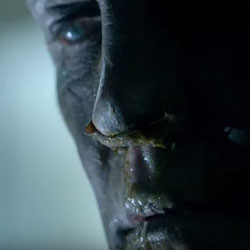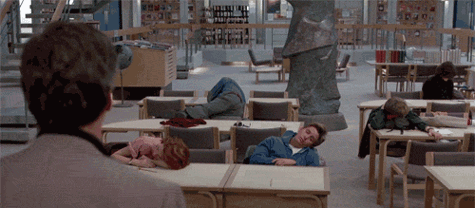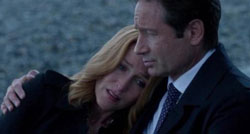
SCULLY: Back in the day, didn't we ever come across the ability to wish someone back to life?
MULDER: I invented it. When you were in the hospital like this.
SCULLY: You're a dark wizard, Mulder.
MULDER: What else is new?
There's a cost for gentrification.
And I'm not just talking money—when cities decide to “clean up” certain neighborhoods and make them more appealing to businesses and families, what do you suppose happens to the poor and homeless who used to walk those alleys? The ones that used to shelter in those run down buildings?
It's a fraught topic of debate; a real bone of contention. And in this week's episode, Mulder and Scully face some unusually bloody ramifications from such a project.
The opening shot of men using power hoses against the homeless sure does hit straight to the gut, especially given the demonstrations, protests, and marches in recent years. Right from the get go, we're meant to sympathize with the people who are literally being washed off the street like trash, treated as less than human.
So when a garbage truck pulls up outside of the offices of the men responsible, and a hulking, rotting figure steps inside, we already know what's coming.
 It's a brutal sort of justice: a figure embodying the trash, the homeless, everything thrown carelessly aside and ignored, coming back to enact a bloody revenge on those who most embody the system responsible.
It's a brutal sort of justice: a figure embodying the trash, the homeless, everything thrown carelessly aside and ignored, coming back to enact a bloody revenge on those who most embody the system responsible.
And on a less symbolic, less meaningful note, seeing a man literally disarmed with a single yank is awesome in the original sense of the word.
The X-Files has never held back when it comes to shocking the audience—it's nice to see this new run is staying true to that spirit.
As Mulder (David Duchovny) digs into exactly what the Band-Aid Nose Man is, Scully (Gillian Anderson) gets some bad news. Mother Margaret Scully (Sheila Larken) is in the hospital following a heart attack and has fallen into a coma.
Scully, of course, is no stranger to either hospitals or comas, and rushes to her mother's bedside to find that the last thing she asked for was her long-lost brother, Charlie.
(Personally, I was just glad that abrasive brother Bill didn't make an appearance. I can't be the only one to find him a complete jackass—can I get a show of hands?)

In a phone conversation with the aforementioned Bill, Scully reveals that her mother wanted to be kept on life support as long as possible; they had discussed the possibility following Dana's own coma experience. The scene was a nice call-back and felt in keeping with the miraculous nature of Dana's recovery and her mother's abiding faith.
But Margaret's doctor reveals that she had amended that decision, and Scully is forced to watch them take her mother off the machines. At least Mulder is there with her by then, another seasoned pro when it comes to bedside death vigils.
Given their chilly relationship in last month's pilot, it's reassuring to see them finding each other again as the season progresses. It feels so much more natural to see Mulder reaching for Scully, taking her hand and offering her a supportive hug during such emotionally heightened moments.
It definitely warms the dark, cold cockles of my heart, anyway.
Meanwhile, the Band-Aid Nose Man kills a few more unworthies—including a couple of twenty-something art thieves trying to appropriate his image for their own gain in an especially gory scene and a woman who seems to be fighting for the homeless but is actually living a life of gaudy excess.
When Margaret Scully passes, a distraught Dana Scully insists she get back to work to distract herself from the pain. She and Mulder track down the artist behind the Band-Aid Nose Man graffiti in a fun sequence where Scully gets to lay some smack-down on a suspect and Mulder plays the “old man” card:
MULDER: What? I wasn't gonna shoot the kid. I don't do stairs anymore.
SCULLY: Mulder, back in the day, I used to do stairs in three-inch heels.
MULDER: 'Back in the day'? Scully, back in the day is now.
Boy, do I love when Mulder gives her the cow eyes and tells her how great she is.
The artist, Trashman (punk band Rancid's frontman, Tim Armstrong), claims that the Band-Aid Nose Man is a piece of art that has surpassed its maker— he created him from a need to give a voice to the “trash” of the city, but no longer has any control over him.
While Trashman explains, Scully can't help but think of son William—who was already on her mind following her mother's death. The implication that William is another being created from a desperate need and desire is a meaty one, and an idea I vastly prefer over past explanations.
 The closing scene of our heroes looking out at a rocky beach with Margaret's ashes beside Sculls is a poignant one. Anderson knows just how to kick my tear ducts into high gear, and I found myself sniffling as she fully unburdened herself to Fox. (In fact, the entire episode was an opportunity for the actress to shine, and she proved again just why she has those awards on her shelf.)
The closing scene of our heroes looking out at a rocky beach with Margaret's ashes beside Sculls is a poignant one. Anderson knows just how to kick my tear ducts into high gear, and I found myself sniffling as she fully unburdened herself to Fox. (In fact, the entire episode was an opportunity for the actress to shine, and she proved again just why she has those awards on her shelf.)
Scully's fears—that their son may feel himself “thrown away like trash,” abandoned and unwanted by his birth parents—echo those of many who give children up for adoption. Most didn't have such an extreme reason behind their choice as Scully did, but that doesn't change the universality of the sentiment.
It's one of the most powerful things about The X-Files: the way it addresses so many human experiences. For all of its outlandish premises and impossible scenarios, so many of the show's themes and characters are relatable for a huge swathe of the audience.
“Home Again” proved a melancholy and dark turn following the zany fun of last week's “Mulder and Scully Meet the Were-Monster”—a reminder that The X-Files fully embraces extremes. There are only two episodes left in this run, and given the stellar quality of the last three, that absolutely doesn't feel near enough.
Here's hoping that the last two stories contain just as much punch, and that all of this talk of William leads somewhere—after so many references to the littlest Mulder, I'll be downright disappointed if we don't get some sort of satisfaction.
See also: The X-Files 10.03: “Mulder and Scully Meet the Were-Monster”
Angie Barry wrote her thesis on the socio-political commentary in zombie films. Meeting George Romero is high on her bucket list, and she has spent hours putting together her zombie apocalypse survival plan. She also writes horror and fantasy in her spare time, and watches far too much Doctor Who. Come find the angie bee at Tumblr.
